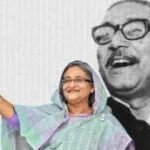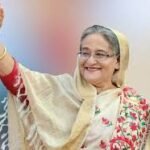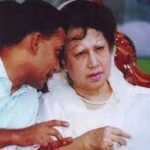Bangladesh is conducting the 12th General election on 7th of January. With the opposition apparently absent, Sheikh Hasina is going to win the election fourth time as the main opposition party BNP (Bangladesh Nationalist Party) is boycotting the ongoing elections.
The elections are being followed by the month-long violent protests against Sheikh Hasina. This article will delve into her life, political career and her journey of becoming the “Lady Don” of Bangladesh.
Who is Sheikh Hasina?
Sheikh Hasina is serving as the 10th Prime Minister of Bangladesh since 2009. She is the daughter of Sheikh Mujibur Rahman, 1st President of Bangladesh after it got liberation from Pakistan. Her party Awami League is founded by her father.
 Hasina’s entire family was killed during the August 15, 1975, Bangladeshi coup d’état, which also saw the assassination of Sheikh Mujibur Rahman, except her spouse, kids, and sister Sheikh Rehana. At the time of the murder, Hasina, Wazed, and Rehana were on a European tour. They sought sanctuary in the home of the Bangladeshi ambassador to Germany before accepting Indian Prime Minister Indira Gandhi’s offer of political asylum.
Hasina’s entire family was killed during the August 15, 1975, Bangladeshi coup d’état, which also saw the assassination of Sheikh Mujibur Rahman, except her spouse, kids, and sister Sheikh Rehana. At the time of the murder, Hasina, Wazed, and Rehana were on a European tour. They sought sanctuary in the home of the Bangladeshi ambassador to Germany before accepting Indian Prime Minister Indira Gandhi’s offer of political asylum.
For six years, the family’s surviving members were exiled to New Delhi, India. The Ziaur Rahman military government denied Hasina entry into Bangladesh. Following her election on February 16, 1981, as President of the Awami League, Hasina returned home on May 17, 1981, to be welcomed by
She served as leader of the opposition from 1991 to 1996. She worked with Khaleda Zia in organizing a protest against Ershad. A huge mass protest was organized against him. The Bangladesh Nationalist Party led by Khalida Zia won a general majority and Hasina’s Awami League emerged as the largest opposition. 
Her family has a prominent name in Bangladesh, we can say that in dynasty politics in Bangladesh, only two parties are active, one is BNP whose main leader Khaleda Zia is jailed, and her son Tarique Rahman is in exile, and the other is Hasina’s family.
During her regime Bangladesh has seen economic growth, the nation’s economy has been stabilized and the garment industry has been greatly boosted by the prime minister Hasina. But since the middle of 2022, the growth has slowed, and analysts predict that the next administration will face significant difficulties maintaining economic stability.
She is accused of oppressing opposition, and they alleged that she doesn’t follow democratic rules and she is behaving like a dictator.
Why is opposition opposing Sheikh Hasina?
Tarique Rahman, the leader of the exiled opposition, has called the election a “sham” intended to cement Hasina’s control. 
In 2023, Rahman’s party organized a months-long protest campaign calling for the prime minister to resign, during which thousands of its followers were detained and at least 11 people were killed.
The reason the BNP is not running is that Hasina turned down its request to hand over control of the election to a caretaker government.
Earlier a Court in Bangladesh sentenced six months jail to Nobel Laureate and economist Muhammad Yunus, who was seen as the main rival of Hasina. 
So, Hasina is accused of oppressing the opposition, who has the potential to defeat her in the election.
Bangladesh Election: “disruption” of democracy?
The election will be observed by more than 100 foreign observers, three of whom are from India.
As per PTI, certain nations, such as the US, have demanded inclusive and reliable polls, while India has declared Bangladesh’s election to be their” internal” matter and denied any kind of interference. 
Sheikh Hasina, whose government has arrested thousands of rival politicians and supporters ahead of the polls, has urged pro-democratic and law-abiding parties not to fuel ideas that “disrupt” the country’s constitutional process, news agency PTI reported.
“Go to the polling stations and cast votes in the morning to show the world that we know how to hold the election in a free and fair manner,” she told a Saturday campaign rally.
There is no doubt regarding the validity of the elections, according to Bangladesh’s Chief Election Commissioner, Kazi Habibul Awal. He said,” One problem is that there is visible violence, and voters are aware of it. I have no problem acknowledging that if it keeps happening, voters might be less inclined to visit polling places”.











